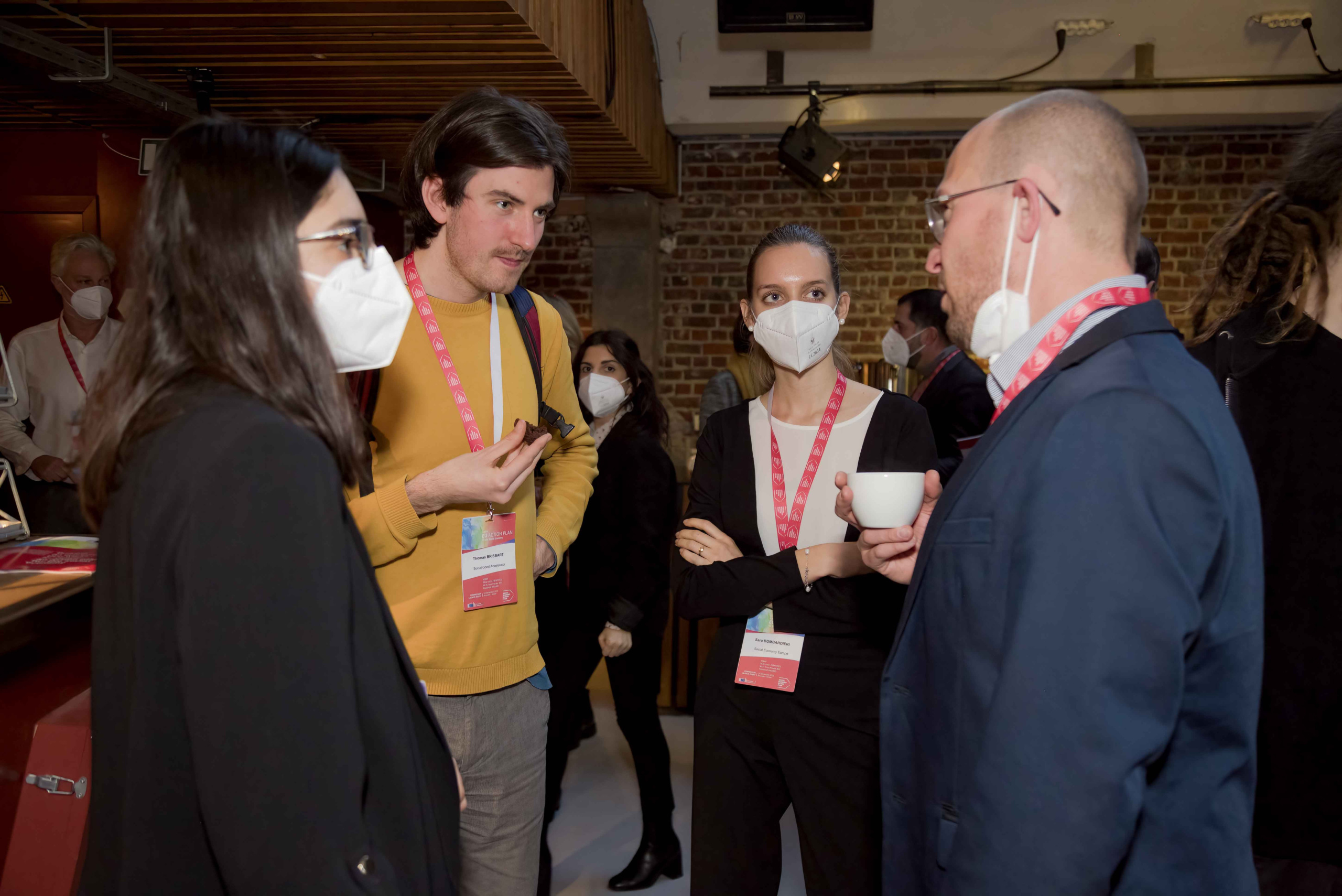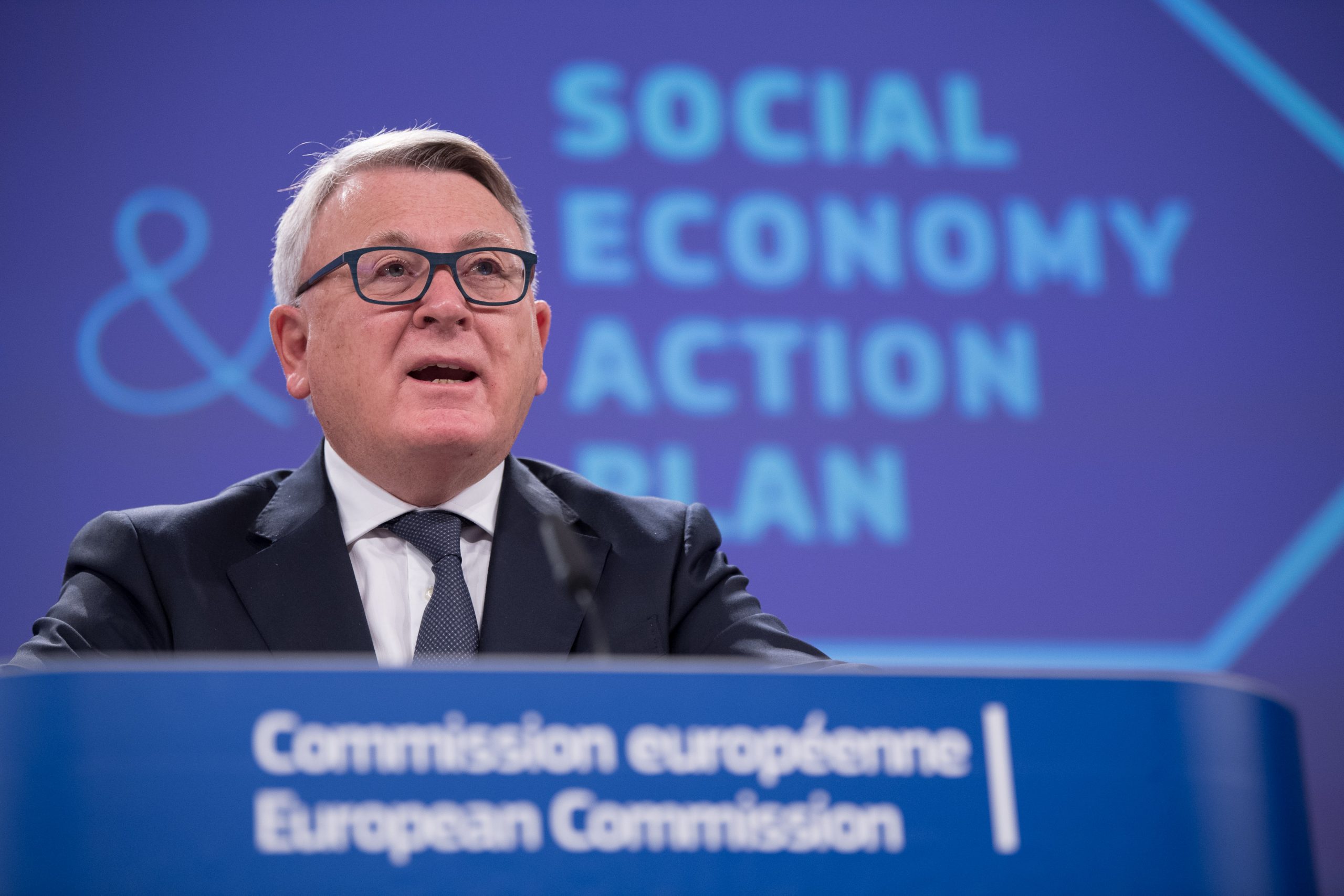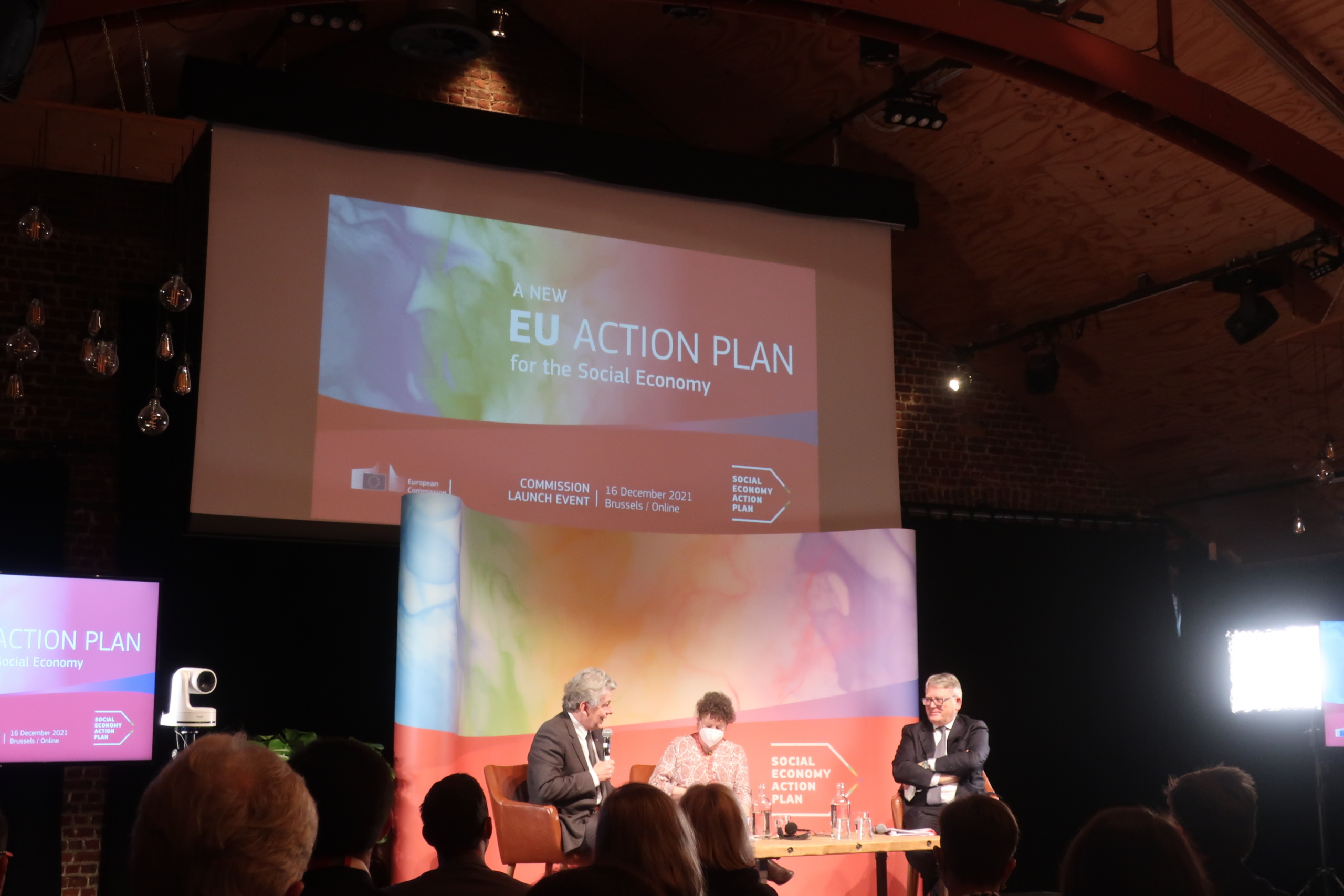Social Economy Action Plan: a first awareness on digital transition?
‘An impressive public policy launched by the EU, which offers a positive project for the EU’. With these words, the team of our partner Social Economy Europe welcomed the Social Economy Action Plan, which will significantly improve a sector in which 6.3% of the EU population is employed. 38 concrete actions will be put in place over the next 9 years to help a sector that is destined to be more and more present in the daily life of EU citizens. One month after the presentation of this plan by Commissioners Schmit and Breton, let’s take a look at some of the highlights of this unprecedented, innovative and ambitious policy document.

From left to right : Marta Lozano Molano (Wazo Cooperative), Tamsin Rose (moderator), Sofi Friedland (Just Arrived) and Stefan van Tulder (Talent Data Labs) talking about new forms of alliances existing in the social economy during the presentation of the Action Plan in Brussels, on 16 December 2021
Source: European Commission

Persons in the attendance of the presentation of the Social Economy Action Plan discussing
Source: European Commission
Between assessments and concrete actions, an ambitious plan for Europe
In its drive to include the most disadvantaged people in labour markets and society, “the social economy is a real pillar that provides essential services” to these same groups. Many EU citizens have access to sustainable employment through the social economy. Indeed, depending on the country, between 0.6% and 9.9% of the population work in this essential sector. However, despite the importance of the sector and the values it promotes, the social economy remains unknown to far too many people.
Nevertheless, the Action Plan explicitly mentions the legal forms of organisations in the sector: cooperatives, foundations, social enterprises, mutuals, and others, which fall within the scope of these new regulations. Measures will be put in place to facilitate the work of cross-border organisations in the sector, both in terms of legislation and taxonomy. These measures will, among other things, help to better anchor the social economy at regional and local level.
In parallel to this issue, the ecological and digital transition will have a key place in the European social economy of tomorrow. There is still a long way to go to get there, even if the ambitions of the action plan are strong to give social economy structures the keys to develop. Several points echo what the Social Good Accelerator has been advocating since its creation in 2018.
Improve the access to fundings and grants
The social economy action plan is accompanied by changes in the line of European budgets in this area. Over two periods of structural investment funds, the differences will be noticeable. Indeed, in the 2014-2020 period, almost 2.5 billion euros have been mobilised for the social economy at EU level. For the next period, the European Commission has indicated its interest in increasing budgets in this area. These ambitions are anchored in the dual objective of developing the social economy, but also of moving towards the success of the next major European meetings for the sector.
In 2023, the EU Council should have adopted all the necessary recommendations for the development of the social economy, before adopting a new single portal for the sector, which will be launched in 2030.
These dates may seem far away, but they are rooted in realism. These tools will be adopted at a time when the social economy will have a much more important place on the continent than it has today.

Persons in the attendance of the presentation of the Social Economy Action Plan discussing
Source: European Commission

Juan Antonio Pedreño (Social Economy Europe) calls to support the implementation of the Action Plan, and talks about the future of Social Economy in the continent.
Source: European Commission
Towards the digital transition of social economy?
With the aim of becoming carbon neutral by 2050, the European Union is banking on renewable energies, but also on the digital transition. So why? The reason is simple: the social economy contributes to the dissemination of good practices and will be able to offer a response to the growth of the circular and collaborative economy in all spheres of society.
This is also in line with the European Pillar of Social Rights, presented in 2017 at the Gothenburg Summit (Sweden). One of the key points of this commitment is to offer basic digital skills to 80% of 16-74 year-olds at EU level. As part of the drive to be one of the most equitable societies in the world, European public authorities have in mind the importance of bridging the existing digital divide through mediation, education and acculturation to digital tools. The social economy is, in its very essence, a real driver for a fair and inclusive digital transition. By deploying basic technological tools, many social economy organisations contribute to this objective of the European pillar of social rights.
Replicating success stories to ensure equitable transitions
To help strengthen this pillar, the action plan focuses on digital tools to enable the social economy to develop fully in the single market. In particular, digital tools can enable social organisations to move from a local to a national or even European level.
Several Member States have inspiring social and digital transformation initiatives on their territory that can be replicated elsewhere. On the point of governance, for example, there are many tools that can be used to move towards a more participatory model, with greater involvement of citizens.
At the level of local authorities, interregional cooperation must be strengthened “to guarantee and stimulate this digital transition”, the action plan states.

Commissionner Schmit presented the Action Plan to the press a few days prior to its public presentation
Source: European Commission

The Commissionners Breton and Schmit presenting the Social Economy Action Plan in Brussels, on 16 December 2021
Source: Social Good Accelerator
The role of social economy actors involved in Tech4Good is also particularly highlighted. Their role in the deployment of digital technologies is described as crucial to the overall impact of making the sector ever more social and ecological. Thus, this particular type of actor also helps to foster new digital business models or cooperations. It is on this particular point that the importance of the collaborative economy and that of platforms, at the heart of a process of revitalisation of the local level, is highlighted.
Maximising the contribution of the social economy to the ecological and digital transitions
The action plan outlines the role of the sector in moving towards a green and digital transition in a number of concrete points and objectives. These transitions will, among other things, provide citizens with a digital future based on people, sustainability and prosperity. They thus serve as a real pivot for replicating and replicating successful initiatives in other localities.
Finally, the role of digital is highlighted in the importance of improving working conditions in the social economy, but not only. Practices such as data management or data processing are unfortunately still marginal in the sector, although the relevance of their use is no longer in question. This is one of the reasons why social enterprises (such as digital transformation accelerators) are seeking to make these digital tools more accessible and affordable, especially for organisations that sometimes have modest means. It remains to be seen how these ambitions will be translated into legislation at European and national levels.
